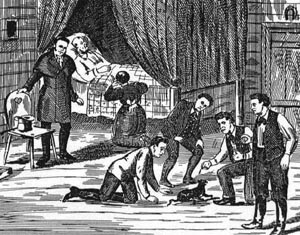John Bell (farmer)
| John Bell | |
|---|---|

John Bell death
|
|
| Born | 1750 Edgecombe County, North Carolina, United States |
| Died | 20 December 1820 Robertson Country, Tennessee, United States |
| Cause of death | Poisoning |
| Resting place | Bellwood Cemetery, Adams, Tennessee, United States |
| Other names | Jack Bell |
| Occupation | Farmer |
| Spouse(s) | Lucy Williams Bell (1770 - 1837) |
| Children | Betsy (1806-1888), Richard (1811-1857), John Jr., Drewry, Benjamin, Jesse |
John Bell (1750 – 20 December 1820) was an American farmer whose death was attributed to supernatural causes. He is a central figure in the Bell Witch ghost story of southern American folklore. In 1817, Bell contracted a mysterious affliction that worsened over the next three years, ultimately leading to his death. According to the story, the Bell Witch took pleasure in tormenting him during his affliction, finally poisoning him one December morning as he lay unconscious after suffering a number of violent seizures.
Born in Edgecombe County, North Carolina, Bell was an apprentice barrel maker during his formative years and later pursued a career in farming. He married Lucy Williams in 1782 and settled on the farm he had bought previously. The Bells prospered over the next eight years and were among the area's most successful planters. In the winter of 1804-1805, Bell and his family embarked on a journey over the treacherous mountains of North Carolina and east Tennessee that took them to an area called “The Barren Plains,” settling in the northwest section of present-day Robertson County, Tennessee.
Bell became a successful farmer and gained prominence in his new abode. It is said that sometime late in 1816, John and his daughter Betsy Bell began to be plagued by a goblin-like entity that came to be known as either the Bell Witch or Kate Batts Witch (after Kate Batts, a neighbour of the Bell family). The Bell Witch apparently appeared to John one day when he was inspecting his fields. It took the form of an animal, but ran off before he could shoot it. The entity then began attacking family members and even visitors to the house, and began haunting the community. The witch became known far and wide, and even Andrew Jackson visited the Bell household in 1819 to experience the Witch at first hand.
Bell's subsequent affliction was most likely a neurological disorder. Very little was known about such disorders in the early nineteenth century, and few treatment options were available, although the Scottish anatomist Sir Charles Bell discovered a neurological disorder that yielded symptoms almost identical to those displayed by John Bell at the onset of his affliction.
John Bell died on 20 December 1820. After his death, the witch was no longer reported as attacking Bell's family. Bell and his wife Lucy are buried in the Bellwood Cemetery. The Bell Witch is said to have disrupted the funeral service, singing bawdy drinking songs.
...
Wikipedia
